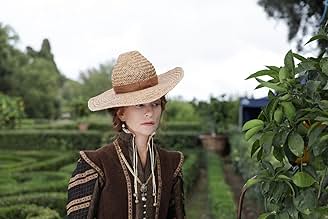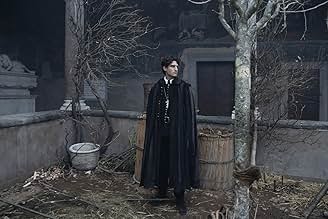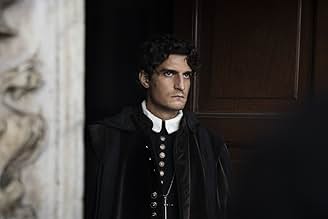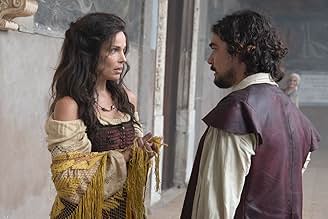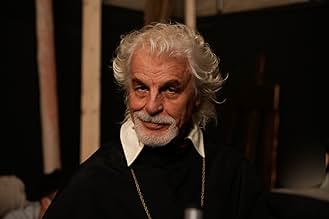PUNTUACIÓN EN IMDb
6,5/10
1,9 mil
TU PUNTUACIÓN
La Iglesia Católica investiga en secreto a Caravaggio mientras el Papa valora si concederle clemencia por matar a un rival.La Iglesia Católica investiga en secreto a Caravaggio mientras el Papa valora si concederle clemencia por matar a un rival.La Iglesia Católica investiga en secreto a Caravaggio mientras el Papa valora si concederle clemencia por matar a un rival.
- Dirección
- Guión
- Reparto principal
- Premios
- 13 premios y 6 nominaciones en total
Reseñas destacadas
I have watched the movie at the cinema, in Timisoara. The movie looks to carefully illustrate the life of the painter. The actors and the actresses are very nice interpretating their roles. The scenes, the costumes, the colours and the decorations are very loyal to the XVII secol, when Caravaggio lived. The main actor, playing as Caravaggio, is a great actor, full of passion.
It is interesting, and still present on our days) the conflict in understanding what is the good and what is bad, because the bad can be find in good and viceversa. And of course, this is an unique truth for each of us.
Even the movie is 2 hours long, I have not figured out when the time passed.
Congratulations to all actors and for the entire team of the movie!
It is interesting, and still present on our days) the conflict in understanding what is the good and what is bad, because the bad can be find in good and viceversa. And of course, this is an unique truth for each of us.
Even the movie is 2 hours long, I have not figured out when the time passed.
Congratulations to all actors and for the entire team of the movie!
Caravaggio's Shadow is a fever dream of a film, vividly photographed and convincingly played by an (unsurprisingly) handsome Italian cast.
There's plenty of melodrama, but it's an Italian period piece; anything less would have felt restrained.
At the heart of it is an irresolvable contradiction: the Vatican and papacy are the immensely rich and powerful core of Catholicism, but Catholicism is anchored by the teachings of Jesus, friend of the poor, the outcast and the desperate. What happens when the Vatican's most talented painter - a devout genius - uses the poor, the disgraced, and the outcasts of society as his subjects in seeking the truth of scripture?
Expect plenty of debauchery, plenty of on-location renaissance architecture, some intrigue, and even some swashbuckling swordfighting.
Worth your time.
There's plenty of melodrama, but it's an Italian period piece; anything less would have felt restrained.
At the heart of it is an irresolvable contradiction: the Vatican and papacy are the immensely rich and powerful core of Catholicism, but Catholicism is anchored by the teachings of Jesus, friend of the poor, the outcast and the desperate. What happens when the Vatican's most talented painter - a devout genius - uses the poor, the disgraced, and the outcasts of society as his subjects in seeking the truth of scripture?
Expect plenty of debauchery, plenty of on-location renaissance architecture, some intrigue, and even some swashbuckling swordfighting.
Worth your time.
The hypocrisy of key Church figures who condemn the sensuality of the painter, all the while competing to hoard his art seems bizarre, the figure of Caravaggio becomes an attractive and sympathetic revolutionary hero in a secular era. While his animalistic rutting grosses me out he gets the best lines. The investigator who travels around interviewing witnesses is so intent on his task he becomes one-dimensional. But the film suffers from such poor narrative construction that it becomes tedious and repetitive, gradually dulling my interest. If the powerful originality of the artist's output were shown more clearly I would have found it more enjoyable.
L'Ombra di Caravaggio promises a fiery portrait of a tortured genius and instead delivers two hours of overwrought mood lighting, erratic time jumps, and enough theatrical whispering to power an entire semester at drama school.
The film adopts the now-inescapable "non-linear" structure, which in this case means the plot zigzags like a drunk fencing master. Sure they toss in a few time markers, but stylistically it's all one long, indistinguishable swirl of tormented men in cloaks.
Our anti-hero Caravaggio is painted (pardon the pun) as your typical Renaissance bad boy: rebellious, tortured, bisexual, brooding, but also - plot twist! - a devout Catholic. Because nothing screams "believable complexity" like orgies one minute and confessions the next. He's supposed to feel radical, but ends up as a kind of art-school Jesus with eyeliner.
Enter "Ombra," the Church's enforcer and a villain so laughably named it's amazing no one bursts out laughing when he introduces himself. Shadow, really? Why not just call him "Father Oppression" and be done with it? He spends most of the film lurking in corners and embodying the Vatican's greatest hits: repression, judgment, and fabulous robes.
As far as the orgies are concerned, we didn't need quite so many scenes of candlelit debauchery, complete with bored courtesans, snarling pigs, and pouting boys.
To pad things out between the sex and the brooding, the film indulges in lavish re-creations of Caravaggio's paintings, which are admittedly striking - if you enjoy watching actors pose like a diorama in a museum gift shop. At times, it feels less like a biopic and more like an over-budgeted PowerPoint presentation on Baroque composition.
And then there's the ending. Since history has left Caravaggio's death ambiguous, the filmmakers go full fan-fiction and cook up a finale that manages to be both absurd and deeply unsatisfying. One almost expects him to ascend into a ray of divine light, paintbrush in hand.
On the plus side the lighting is gorgeous. Every scene looks like it's been lit by angels and Instagram filters. But beautiful visuals can only carry you so far when the script feels like a Gregorian soap opera.
The film adopts the now-inescapable "non-linear" structure, which in this case means the plot zigzags like a drunk fencing master. Sure they toss in a few time markers, but stylistically it's all one long, indistinguishable swirl of tormented men in cloaks.
Our anti-hero Caravaggio is painted (pardon the pun) as your typical Renaissance bad boy: rebellious, tortured, bisexual, brooding, but also - plot twist! - a devout Catholic. Because nothing screams "believable complexity" like orgies one minute and confessions the next. He's supposed to feel radical, but ends up as a kind of art-school Jesus with eyeliner.
Enter "Ombra," the Church's enforcer and a villain so laughably named it's amazing no one bursts out laughing when he introduces himself. Shadow, really? Why not just call him "Father Oppression" and be done with it? He spends most of the film lurking in corners and embodying the Vatican's greatest hits: repression, judgment, and fabulous robes.
As far as the orgies are concerned, we didn't need quite so many scenes of candlelit debauchery, complete with bored courtesans, snarling pigs, and pouting boys.
To pad things out between the sex and the brooding, the film indulges in lavish re-creations of Caravaggio's paintings, which are admittedly striking - if you enjoy watching actors pose like a diorama in a museum gift shop. At times, it feels less like a biopic and more like an over-budgeted PowerPoint presentation on Baroque composition.
And then there's the ending. Since history has left Caravaggio's death ambiguous, the filmmakers go full fan-fiction and cook up a finale that manages to be both absurd and deeply unsatisfying. One almost expects him to ascend into a ray of divine light, paintbrush in hand.
On the plus side the lighting is gorgeous. Every scene looks like it's been lit by angels and Instagram filters. But beautiful visuals can only carry you so far when the script feels like a Gregorian soap opera.
A lot is not known about Caravaggio's life, but a lot is. It is understandable and legitimate that a film like this fills in the unknown gaps. The fact that it twists, falsifies and rewrites the known things is unworthy of a biography.
I am anything but a friend of the Catholic Church and even less of the church leaders. But the way he was portrayed here in a one-sided way as a victim of the church, whose representatives were Caravaggio's most zealous supporters, is infamous. "The Death of Mary" has nothing to do with being rejected by a pope; the monks who commissioned it did that themselves. Because Caravaggio did not paint in accordance with the commission. And the painting was not saved by Rubens, who is said to have bought it in Rome according to the film, but by Ferdinando Gonzaga, Duke of Mantua, the year after it was completed. Or the questioning of Artemisia Gentileschi. Caravaggio probably didn't even know her, even if her father did.
And these inaccuracies, distortions and falsifications run through the entire film, which has only one goal: to save the artist's honor. But he doesn't need to be saved. His art speaks for itself, as does his raw, unbridled character, which borders on brutality. Presenting the church as his murderer is an affront to all the church's real victims.
So an honorable attempt becomes a historically useless piece of work that doesn't bring you any closer to the artist's work. His apotheotic classification as a three-eyed man among the blind is tiring early on in the film.
I am anything but a friend of the Catholic Church and even less of the church leaders. But the way he was portrayed here in a one-sided way as a victim of the church, whose representatives were Caravaggio's most zealous supporters, is infamous. "The Death of Mary" has nothing to do with being rejected by a pope; the monks who commissioned it did that themselves. Because Caravaggio did not paint in accordance with the commission. And the painting was not saved by Rubens, who is said to have bought it in Rome according to the film, but by Ferdinando Gonzaga, Duke of Mantua, the year after it was completed. Or the questioning of Artemisia Gentileschi. Caravaggio probably didn't even know her, even if her father did.
And these inaccuracies, distortions and falsifications run through the entire film, which has only one goal: to save the artist's honor. But he doesn't need to be saved. His art speaks for itself, as does his raw, unbridled character, which borders on brutality. Presenting the church as his murderer is an affront to all the church's real victims.
So an honorable attempt becomes a historically useless piece of work that doesn't bring you any closer to the artist's work. His apotheotic classification as a three-eyed man among the blind is tiring early on in the film.
¿Sabías que...?
- CuriosidadesRiccardo Scamarcio said about Caravaggio's character: "I immediately thought that [Caravaggio] was like Elvis Presley. My reference was Elvis. A small-town boy with great energy, passion, talent and rigor towards art. At that time, painting was the mainstream, there was nothing else, there was no photography, there was no radio, television or cinema. Paintings were so powerful because they spoke directly to the unconscious. And this man was the first to represent sacred images in a completely different way."
- PifiasTodas las entradas contienen spoilers
Selecciones populares
Inicia sesión para calificar y añadir a tu lista para recibir recomendaciones personalizadas
- How long is Caravaggio's Shadow?Con tecnología de Alexa
Detalles
- Fecha de lanzamiento
- Países de origen
- Idiomas
- Títulos en diferentes países
- Caravaggio's Shadow
- Localizaciones del rodaje
- Empresas productoras
- Ver más compañías en los créditos en IMDbPro
Taquilla
- Presupuesto
- 12.261.966 € (estimación)
- Recaudación en todo el mundo
- 4.895.695 US$
- Duración2 horas
- Color
- Relación de aspecto
- 2.39 : 1
Contribuir a esta página
Sugerir un cambio o añadir el contenido que falta

Principal laguna de datos
By what name was La sombra de Caravaggio (2022) officially released in India in English?
Responde
